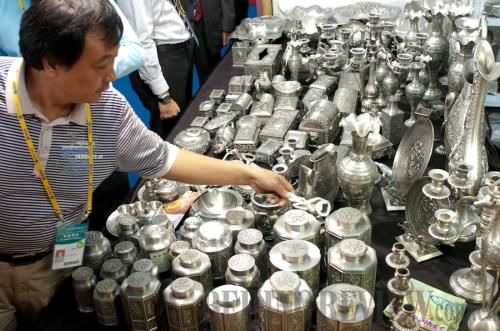|

The year 2009 has witnessed a new era in East Asian cooperation. Against the backdrop of the lingering global financial crisis, combating its shockwaves and striving for recovery have become a uniting force among East Asian countries, and a new theme of East Asian cooperation.
All cooperating mechanisms in this region, including the Association of Southeast Asian Nations (ASEAN), ASEAN Plus Three, ASEAN Plus One and the trilateral cooperation of China, Japan and South Korea, put conquering the financial crisis and promoting economic recovery at the top of their agenda. Faced with the crisis, East Asian countries have stood closely together and made remarkable achievements this year.
 |
|
FILIPINO FLAIR: A visitor checks out tinware from the Philippines at the China-ASEAN (Association of Southeast Asian Nations) Expo on October 20 in Nanning, capital of southwest China's Guangxi Zhuang Autonomous Region (WENG XINYANG) |
Among the accomplishments, the most brilliant one should be the progress of ASEAN cooperation and the adoption of a roadmap for the ASEAN community.
At the 14th ASEAN summit held in Thailand in late February, leaders of the 10 ASEAN member countries reaffirmed the goal of establishing an ASEAN community based on economic integration, security cooperation and socio-cultural cooperation by 2015. And they signed the Roadmap for an ASEAN Community (2009-15), which defined the framework, objectives and measures for building the community in the next seven years.
Meanwhile, a series of economic cooperation documents were also signed. These documents aimed to pave the way for the ASEAN economic community with a free flow of goods, services, investments and skilled workers. However, due to the financial crisis and the great differences within ASEAN, the implementation of the roadmap will be filled with challenges.
The second notable achievement was the breakthrough in Northeast Asian economic cooperation. Northeast Asian cooperation has always been a difficult point in East Asian cooperation. But, since the end of 2008, things have changed toward a positive direction.
In December 2008, the first summit of China, Japan and South Korea was held in Fukuoka, Japan and clearly defined their tripartite partnership. In October this year, the three held their second summit in Beijing and put forward 10 cooperative initiatives.
It is noteworthy that the trilateral cooperation of China, Japan and South Korea, which constitutes the core of East Asian economy, has been officially out of the ASEAN Plus Three framework and become a separate cooperation mechanism in East Asia.
Nevertheless, the ASEAN Plus Three framework itself has also created a lot of success. In October this year, the 12th ASEAN Plus Three summit was held in Thailand. It approved the agreement passed by the ASEAN Plus Three Finance Ministers in Bali, Indonesia in May this year. According to the agreement, by the end of this year they will establish a regional reserve pool worth $120 billion—known as the Chiang Mai Initiative Multilateralization—as well as an independent regional economic monitoring institution.
What's more, the summit issued a statement on cooperation on food security and bio-energy development. It reiterated the role of the ASEAN Plus Three mechanism as the main channel for realizing the long-term goal of establishing an East Asian community, while emphasizing ASEAN should play a leading role in this process. In addition, the summit decided close cooperation was essential to ensure the success of the Copenhagen climate conference in December.
Cooperation between China and ASEAN has also made remarkable achievements this year. In April, China announced a series of measures to promote cooperation with ASEAN, including establishing the China-ASEAN Investment Cooperation Fund worth $10 billion, providing $15 billion in credit support to ASEAN countries, and providing 270 million yuan ($38.6 million) in special assistance to less developed ASEAN members.
Later, on October 24, at the 12th China-ASEAN summit, China advocated formulating an action plan to implement the Joint Declaration on ASEAN-China Strategic Partnership for Peace and Prosperity from 2011 to 2015, in order to upgrade China-ASEAN relations.
Given that the construction of China-ASEAN free trade area is to be completed in 2010, China suggested conducting joint training on policies and regulations of the free trade area. What's more, it put forward a series of other initiatives, such as establishing economic cooperation zones in ASEAN countries, protecting intellectual property, establishing a unified customs inspection and quarantine system for animals and plants, among others.
Meanwhile, China will send a permanent mission to ASEAN, promote the development of Mekong Sub-region, advance China's cooperation with the East ASEAN Growth Area, including Brunei, Indonesia, Malaysia and the Philippines, and boost the economic cooperation in the pan-Beibu Gulf area.
The last notable achievement in East Asian cooperation was the successful holding of the fourth East Asia Summit on October 25. Members of the summit were all 10 members of ASEAN together with China, Japan, South Korea, India, Australia and New Zealand. They discussed pressing issues such as the Korean Peninsula nuclear issue, financial stability, trade protectionism and the prospect of an East Asian free trade area.
| 